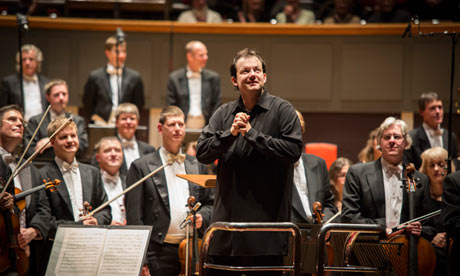
Another Beethoven cycle? Not for Andris Nelsons. This is his first. He and his City of Birmingham Symphony Orchestra reached the Sixth and Seventh symphonies this week, with one concert left to go. After the breathless, bacchanalian frenzy which brought No 7 to a close and many in the capacity audience to their feet, it was clear something remarkable had taken place. I had to remind myself that "wow" is not yet acceptable in the critical lexicon except on Twitter.
Time and again the Latvian maestro urged the orchestra to their feet. Repeatedly they refused to budge, banging on their stands, stamping on the floor. You might think that he, not they, had made the phenomenal sounds we had just heard. In the end Nelsons wiped his brow and looked bemused, as if to acknowledge that, yes, perhaps after all he played some part in the alchemy. He took his bow, waving his hands like wings as if trying to embrace his entire orchestra.
The concert started with great serenity. The CBSO's admired and popular leader, Laurence Jackson, stepped forward as the fine soloist in Beethoven's Romance No 1, an ideal prelude to the non-heroic "Pastoral" symphony. Nelsons retained a relaxed and pliant mood, encouraging rude, rustic interventions from the bassoon and shaping the cuckooing woodwind with a deliberation and nuance that were never mannered. Only in the thunderstorm, ushered in by some nimble pitter-pattering rain from the second violins, did he encourage an ear-shattering fortissimo from brass and timps.
In the Seventh, too, speeds were fast, but Nelsons knows how to let the music breathe. In the minor-key Allegretto, counterpoint was transparent, each line supple rather than sombre or onerous. Each of the CBSO principals shone – hard to pick from the many, but flute and trumpet especially deserve mention – and reminded us why music from the past, played like this, is precisely as new and alive as a great performance of Hamlet, though no one ever complains, as they do about canonical composers, that Shakespeare is a "dead writer". The cycle will be released, date not yet announced, on Orfeo.
In a red-letter week, Nelsons and the CBSO also gave a concert performance of The Flying Dutchman with a top cast and sensational playing. Nelsons has frequently confessed his cradle devotion to Wagner – the music that first inspired him as a child – memorably demonstrated in Birmingham performances of Lohengrin and Tristan. Given the current flock of aerial Dutchmen – with new stagings last month in Belfast, next in Scotland – this is not the place to dwell on the story. The artistry of singers and players is what counts. The six-strong cast was dominated by James Rutherford in the title role, anguished yet almost aloof and noble in his agony as the seafarer who can never find rest.
As Senta, the dreamy girl who falls for him, the American Jennifer Wilson had exciting vocal power, sometimes pushing too hard to the detriment of intonation. Yet this merely emphasised the sense of this being a woman unhinged. Arnold Bezuyen as Erik was equally uneven but conveyed his despair with some blistering high notes. Alastair Miles imaginatively captured the shallow greed of Daland. Nicky Spence as the Steersman showed touching vitality and humour, with Jane Henschel characterful as Mary. The 100-strong CBSO Chorus sang with visceral intensity. As for Andris Nelsons, we have a great Wagnerian in our midst. In fact, let's face it, he's not bad all round.
Tchaikovsky, who once said that coming out of a Wagner opera (not Dutchman) was like being "set free from prison", intended his Eugene Onegin to be sung by young voices. The Royal Academy of Music chose it for their spring production. Jane Glover, the RAM's director of opera, who also conducted, elicited momentum and fluency from the small but accomplished orchestra, and gave expert encouragement to the singers. The director John Ramster and designer Adrian Linford kept the production simple, in 1820s empire style, flattering only to the few but never mind.
In the second of two casts, Sara Lian Owen sang Tatyana with richness of tone and a real gift for conveying emotion. Her blossoming from awkward teenager to married yet fragile woman was well conveyed. Gareth John's Onegin and Samuel Furness's Lensky were outstanding – both names to watch – with exceptional singing from these two ex-St John's, Cambridge choristers even if they did have to wear terrible lank, piratical wigs. Furness held on to his top-note farewell with a cheeky persistence that had you gasping. But this was the last night of the run and he could do it, so why not? In a work suffused with poignancy, it was nice to smile.

